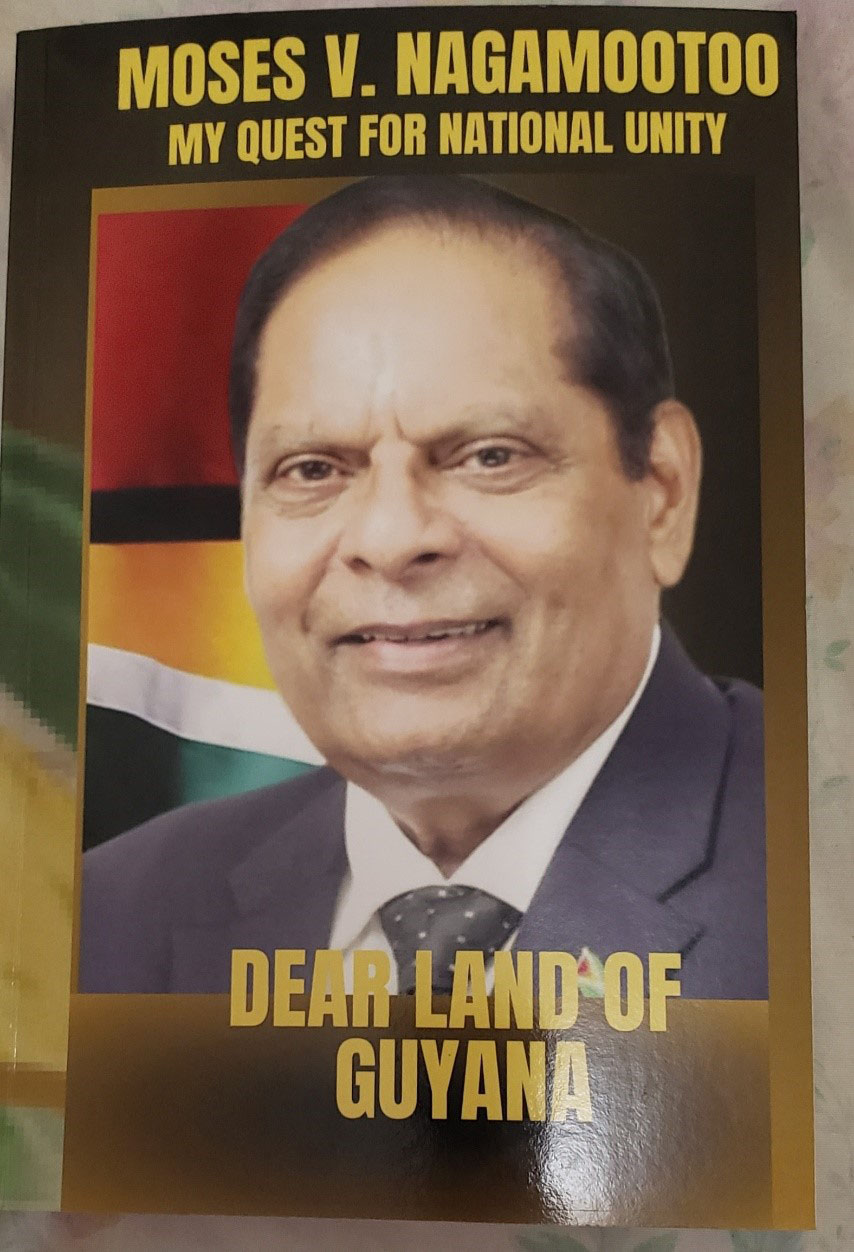A review by Christopher Ram
Introduction
Coming out from seclusion roughly 3 1/2 years after the end of his prime ministership of the APNU+AFC Coalition Govern-ment 2015 – 2020, long-serving politician and attorney-at-law Moses Nagamootoo has published his autobiographical account of that period. He is the second leading member of the Alliance For Change in that Government to offer Guyanese their account of their respective roles during that period.
The first was by Natural Resources Minister Raphael Trotman whose book From Destiny to Prosperity was serialised in parts 110 – 113 of my oil and gas column in the Stabroek News in October/ November last year. My initial intention was to apply a different approach to Nagamootoo’s book offering only a book review rather than a serialisation but having created the precedent with Trotman‘s book, beginning today and continuing over the next couple weeks, I will offer a summary of Moses’ book but leaving it to the reader to fill in the details. The book is available for purchase from Austin‘s Bookstore in Georgetown at the price of $4,000 per copy.
Journalistic and literary pedigree
Unlike Trotman’s book, Dear Land of Guyana is a full-length book of 344 pages of twenty-five chapters and the transcripts of three full-length interviews the writer had given to Mr. Yesu Persaud in a television programme Eye on The Issue and journalists Gordon Moseley and Denis Chabrol. Coming from a seasoned writer with literary achievements including two novels – Hendree’s Cure and Frag-ments from Memory – a collection of poems, Paintings in Poetry, and short stories Like Scattered Seeds, the flow of the writing and the quality of the production is of a high quality. His other literary credentials are not unimpressive, having covered major events in Guyana and the rest of the Caribbean as a former Vice President of the International Organisation of Journalists and founder of the Union of Guyanese Journalists.
He was a popular columnist in the PPP sponsored newspaper the Mirror and also credits himself as speech writer, and researcher for former president Dr Cheddi Jagan, assisting the former PPP leader and President in many of his articles and speeches. The book is well-organised, contains quotes from many books and sources, providing specific details of events and personalities which suggest that the writer Nagamootoo had always intended to offer Guyanese an insight into the writer’s experiences as a participant in the government of the country. In doing so however, engaged in a mix of facts, impression, speculation and conclusions some of which may seem extreme and far-fetched.
Speculation and conspiracy
I will mention two examples. Connecting the 2018 No Confi-dence Motion to prior incidents, the writer referred to an invitation by India’s ruling BJP including references to the BJP Government of Prime Minister Narendra Modi to Guyanese parliamentarians of Indian Origin for a one-day conference in India, outside of the normal diplomatic channels. According to him, the PPP sent 17 MPs to the conference, including former president and opposition leader Bharrat Jagdeo, former minister Irfaan Ali and former Attorney General Anil Nandlall, while only three Indo-Guyanese from the governing parties were invited, including Charrandass Persaud. Continuing, the book states that “Being far away from Guyana, at the same conference, and at the same place, it must have been too tempting (for Jagdeo and Charrandass Persaud) not to talk.”
While he did not name the other two MPs from their side, Moses linked that occasion with his own prior experience with the Indian Government some ten years earlier during a visit to India to accept an award from an NGO. According to him, he was approached with an offer of support by two seemingly well-connected, ultra nationalist elements, one of whom had since ascended to a top government post under the BJP. The condition? That Nagamootoo commit himself to certain Indian geo-political and strategic interests in the Carib-bean Indo-populated triad – Guyana, Trinidad and Suriname. According to the writer, they scooted when he offered them a drink of a 15 -year Guyana rum from under his desk.
The second was a US Govern-ment connection. The writer reported that on his return from a trip abroad, his head of security informed him that a powerful foreign businessman wanted to meet him urgently. He let that slide but then on 7 February 2020, on a trip to the Rupununi, he met a tall and lean (unnamed) man in blue shirt and khaki pants and the person’s wife who was introduced as the niece of Mike Pompeo. Apparently, the man wanted a large tract of land to use for “skills training programs” and that the project would focus on disaster emergencies for which he would access various types of aircraft, even promising Black Hawk helicopters.
In developing this episode, or rather speculating further, the writer linked the approach with a Reuters report that the US Department of State had posted a $15 million reward for the arrest or capture of Venezuelan President Maduro. Nagamootoo speculated that “mercenaries” could have contemplated an armed incursion into that neighbouring state, using Guyana as a launching pad.
When Nagamootoo reported his Rupununi encounter to President Granger, he was told not to “touch that man …. The guy wants to meet you about a training project.”
Preliminary response
The book ought to demand some response, denial or corroboration to the several incidents although with the absence of a reading culture in Guyana, there may be few direct responses. A former colleague of Nagamootoo from his PPP days was quite dismissive of the book despite not having read it while at the same time expressing an unwillingness to criticise the book because of the “sterling work which author had rendered to the PPP during the struggle for free and fair elections.”
A more recent colleague, having read Chapter 3 Foreign Interference, again, offered this view of what can be considered the most provocative chapter of the book.
“He’s described a few factual events and framed them in the context of American interests in the region and then connected those events via conjecture to America’s interference in our 2020 elections, leaving readers to make some mental leap to rigging. I sense a blurring of the line between interference and rigging. Also, did the interference occur prior to, or after the elections, or both? The reference to Ambassador Lynch doing what she had to do is meaningless without elaboration.
“I don’t think he makes a strong enough case that there was anything unusually sinister about our 2020 elections other than the attempted rigging by GECOM which was rightfully condemned by many, including the Americans. There’s a lot that can be stripped away such as the earlier Trinidadian experience with Cambridge Analytics and the 2015 Ramotar campaign. These really have no bearing on anything that may have taken place in 2020.
“The clear attempt by persons in GECOM to rig the 2020 elections remains unaddressed – at least in that chapter.”
The writer can also be very direct. He also accuses former president Donald Ramotar and PPP senior member Harry Nokta, of heckling him at the funeral of Isahack Basir, a PPP/C stalwart , singling out Ramotar for making the damning accusation that “Moses kill Basir”.
To be continued






